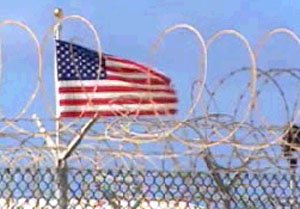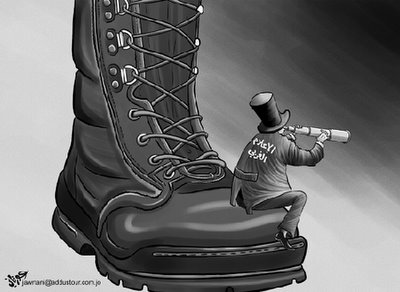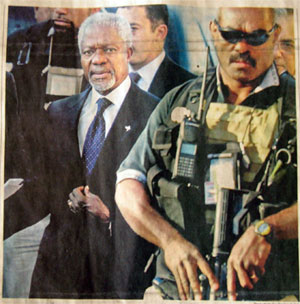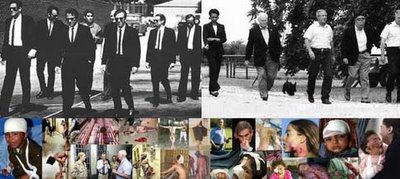 The big thawGlobal disaster will follow if the ice cap on Greenland melts. Now scientists say it is vanishing far faster than even they expected.
The big thawGlobal disaster will follow if the ice cap on Greenland melts. Now scientists say it is vanishing far faster than even they expected.Geoffrey Lean reports
Published: 20 November 2005
Link HereGreenland's glaciers have begun to race towards the ocean, leading scientists to predict that the vast island's ice cap is approaching irreversible meltdown, The Independent on Sunday can reveal.
Research to be published in a few days' time shows how glaciers that have been stable for centuries have started to shrink dramatically as temperatures in the Arctic have soared with global warming. On top of this, record amounts of the ice cap's surface turned to water this summer.
The two developments - the most alarming manifestations of climate change to date - suggest that the ice cap is melting far more rapidly than scientists had thought, with immense consequences for civilisation and the planet. Its complete disappearance would raise the levels of the world's seas by 20 feet, spelling inundation for London and other coastal cities around the globe, along with much of low-lying countries such as Bangladesh.
More immediately, the vast amount of fresh water discharged into the ocean as the ice melts threatens to shut down the Gulf Stream, which protects Britain and the rest of northern Europe from a freezing climate like that of Labrador.
The revelations, which follow the announcement that the melting of sea ice in the Arctic also reached record levels this summer, come as the world's governments are about to embark on new negotiations about how to combat global warming.
This week they will meet in Montreal for the first formal talks on whether there should be a new international treaty on cutting the pollution that causes climate change after the Kyoto protocol expires in seven years' time. Writing in The Independent yesterday, Tony Blair called the meeting "crucial", adding that it "must start to shape an inclusive global solution". But little progress is expected, largely because of continued obstruction from President George Bush.
The new evidence from Greenland, to be published in the journal Geophysical Research Letters, shows a sudden decline in the giant Helheim glacier, a river of ice that grinds down from the inland ice cap to the sea through a narrow rift in the mountain range on the island's east coast.
Professor Slawek Tulaczyk, of the Department of Earth Sciences at the University of California, Santa Cruz, told the IoS that the glacier had dropped 100 feet this summer.
Over the past four years, the research adds, the front of the glacier - which has remained in the same place since records began - has retreated four and a half miles. As it has retreated and thinned, the effects have spread inland "very fast indeed", says Professor Tulaczyk. As the centre of the Greenland ice cap is only 150 miles away, the researchers fear that it, too, will soon be affected.
The research echoes disturbing studies on the opposite side of Greenland: the giant Jakobshavn glacier - at four miles wide and 1,000 feet thick the biggest on the landmass - is now moving towards the sea at a rate of 113 feet a year; the normal annual speed of a glacier is just one foot.
The studies have found that water from melted ice on the surface is percolating down through holes on the glacier until it forms a layer between it and the rock below, slightly lifting it and moving it toward the sea as if on a conveyor belt. This one glacier alone is reckoned now to be responsible for 3 per cent of the annual rise of sea levels worldwide.
"We may be very close to the threshold where the Greenland ice cap will melt irreversibly," says Tavi Murray, professor of glaciology at the University of Wales. Professor Tulaczyk adds: "The observations that we are seeing now point in that direction."
Until now, scientists believed the ice cap would take 1,000 years to melt entirely, but Ian Howat, who is working with Professor Tulaczyk, says the new developments could "easily" cut this time "in half".
There is also a more immediate danger as the melting ice threatens to disrupt the Gulf Stream, responsible for Britain's mild climate. The current, which brings us as much heat in winter as we get from the sun, is driven by very salty water sinking off Greenland. This drives a deep current of cold ocean southwards, in turn forcing the warm water north.
Research at the Woods Hole Oceanographic Institute in Massachusetts has shown, that even before the glaciers started accelerating, the water in the North Atlantic was getting fresher in what it describes as "the largest and most dramatic oceanic change ever measured in the era of modern instruments".
Even before these discoveries, scientists had shortened to evens the odds on the Gulf Stream failing this century. When it failed before, 12,700 years ago, Britain was covered in permafrost for 1,300 years.
Greenland's glaciers have begun to race towards the ocean, leading scientists to predict that the vast island's ice cap is approaching irreversible meltdown, The Independent on Sunday can reveal.
Research to be published in a few days' time shows how glaciers that have been stable for centuries have started to shrink dramatically as temperatures in the Arctic have soared with global warming. On top of this, record amounts of the ice cap's surface turned to water this summer.
The two developments - the most alarming manifestations of climate change to date - suggest that the ice cap is melting far more rapidly than scientists had thought, with immense consequences for civilisation and the planet. Its complete disappearance would raise the levels of the world's seas by 20 feet, spelling inundation for London and other coastal cities around the globe, along with much of low-lying countries such as Bangladesh.
More immediately, the vast amount of fresh water discharged into the ocean as the ice melts threatens to shut down the Gulf Stream, which protects Britain and the rest of northern Europe from a freezing climate like that of Labrador.
The revelations, which follow the announcement that the melting of sea ice in the Arctic also reached record levels this summer, come as the world's governments are about to embark on new negotiations about how to combat global warming.
This week they will meet in Montreal for the first formal talks on whether there should be a new international treaty on cutting the pollution that causes climate change after the Kyoto protocol expires in seven years' time. Writing in The Independent yesterday, Tony Blair called the meeting "crucial", adding that it "must start to shape an inclusive global solution". But little progress is expected, largely because of continued obstruction from President George Bush.
The new evidence from Greenland, to be published in the journal Geophysical Research Letters, shows a sudden decline in the giant Helheim glacier, a river of ice that grinds down from the inland ice cap to the sea through a narrow rift in the mountain range on the island's east coast.
Professor Slawek Tulaczyk, of the Department of Earth Sciences at the University of California, Santa Cruz, told the IoS that the glacier had dropped 100 feet this summer.
Over the past four years, the research adds, the front of the glacier - which has remained in the same place since records began - has retreated four and a half miles. As it has retreated and thinned, the effects have spread inland "very fast indeed", says Professor Tulaczyk. As the centre of the Greenland ice cap is only 150 miles away, the researchers fear that it, too, will soon be affected.
The research echoes disturbing studies on the opposite side of Greenland: the giant Jakobshavn glacier - at four miles wide and 1,000 feet thick the biggest on the landmass - is now moving towards the sea at a rate of 113 feet a year; the normal annual speed of a glacier is just one foot.
The studies have found that water from melted ice on the surface is percolating down through holes on the glacier until it forms a layer between it and the rock below, slightly lifting it and moving it toward the sea as if on a conveyor belt. This one glacier alone is reckoned now to be responsible for 3 per cent of the annual rise of sea levels worldwide.
"We may be very close to the threshold where the Greenland ice cap will melt irreversibly," says Tavi Murray, professor of glaciology at the University of Wales. Professor Tulaczyk adds: "The observations that we are seeing now point in that direction."
Until now, scientists believed the ice cap would take 1,000 years to melt entirely, but Ian Howat, who is working with Professor Tulaczyk, says the new developments could "easily" cut this time "in half".
There is also a more immediate danger as the melting ice threatens to disrupt the Gulf Stream, responsible for Britain's mild climate. The current, which brings us as much heat in winter as we get from the sun, is driven by very salty water sinking off Greenland. This drives a deep current of cold ocean southwards, in turn forcing the warm water north.
Research at the Woods Hole Oceanographic Institute in Massachusetts has shown, that even before the glaciers started accelerating, the water in the North Atlantic was getting fresher in what it describes as "the largest and most dramatic oceanic change ever measured in the era of modern instruments".
Even before these discoveries, scientists had shortened to evens the odds on the Gulf Stream failing this century. When it failed before, 12,700 years ago, Britain was covered in permafrost for 1,300 years.
--Ohhh..
Holy.
Shit.
DANGERWILLROBINSONDANGER!!!!!!!!!
SOMEBODYWAKEUPSOMEBODYANDCALL..SOMEBODY!!!---


















 The providers of the weapons of mass destruction to Saddam revealed by smoking gun documents found at Bilad weapons depot (left to right): Rumsfeld college roomie, SecDef, and Carlyle head Carlucci; Poppy Bush; and Donald Rumsfeld, special envoy to Saddam
The providers of the weapons of mass destruction to Saddam revealed by smoking gun documents found at Bilad weapons depot (left to right): Rumsfeld college roomie, SecDef, and Carlyle head Carlucci; Poppy Bush; and Donald Rumsfeld, special envoy to Saddam The Green Palace and Lake Tharthar: evidence of U.S. collusion in providing WMDs to Iraq lies at its bottom
The Green Palace and Lake Tharthar: evidence of U.S. collusion in providing WMDs to Iraq lies at its bottom
 CIA Torture Flight N196D
CIA Torture Flight N196D














